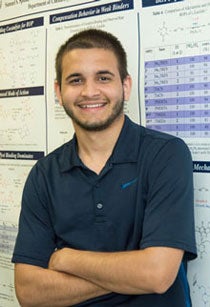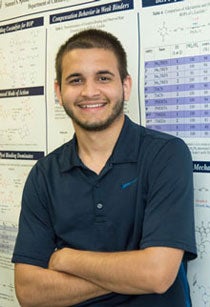 KINGSTON, R.I.–July 20, 2015– Last year as a sophomore, Samuel Spink, a biomedical engineer and Spanish major, never imagined he would get the opportunity to do hands-on research at the University of Rhode Island.
KINGSTON, R.I.–July 20, 2015– Last year as a sophomore, Samuel Spink, a biomedical engineer and Spanish major, never imagined he would get the opportunity to do hands-on research at the University of Rhode Island.
“I applied to be in the Summer Undergraduate Research Fellowship (SURF) program in order to get some exposure to a research lab environment, enhance my knowledge on the subject matter of this lab, and most importantly work with graduate students and professors that have plenty of experience to share,” said Spink of Kingston.
For his second summer in a row, Spink will be working on an ongoing project with Matthew Kiesewetter, assistant professor of chemistry, as a part of the SURF program.
The program is supported by two federal agencies. One, called the IDeA Networks of Biomedical Research Excellence (INBRE), is funded by the National Institutes of Health, and is directed by Professor Zahir Shaikh at URI’s College of Pharmacy. URI has been granted $61 million since 2001 from NIH to expand biomedical research capacity in Rhode Island. The complementary program is the Experimental Program to Stimulate Competitive Research (EPSCoR), funded through a total of $26.75 million in grants awarded to URI from the National Science Foundation.
Not only does the program allow undergraduates to work closely with a leading researcher, it also provides them a stipend so they can focus on their research and not how they generate income during the summer.
“I applied again this year for a few reasons. Firstly, I developed and improved many skills during my time in Dr. Kiesewetter’s lab,” said Spink. “I believed that with such a solid starting point already behind me I would be able to continue my research at an even more productive rate this summer.”
This summer, Spink and Kiesewetter will be working on research that they had been working on in the lab throughout the school year having to do with speeding up ring-opening polymerizations by tethering together what typically would be two separate, identical cocatalyst molecules, studying how it works and why it works faster.
According to Kiesewetter, the importance of polymers and catalysts can hardly be overstated. The broad class of materials called ‘polymers’, which are made from monomers through a process called polymerization, is made up of a all synthetic plastics and biological molecules like DNA, RNA, proteins, carbohydrates, etc. This year more than 500 billion pounds of plastics will be produced world wide through catalytic polymerization reactions. A catalyst is a chemical compound that allows an otherwise slow or impossible reaction to happen. Many polymers are made through catalytic processes.
“In a world that makes 500 billion pounds of plastic a year, reducing chemical waste through catalysts that are more efficient is thinking big! We hope that this brings positive attention to URI and, hopefully, industrial collaborations,” said Kiesewetter.
The combination of his previous project and current project, which have been ongoing, will be what he will present at the end of the program at the SURF conference at URI on July 31, which will also showcase the work of other URI undergraduates and many others from other colleges in Rhode Island participating in the INBRE and EPSCoR programs.
The experience has not only given Spink the opportunity to do hands-on research in his field of interest, but it has also strengthened his academic record and resume.
“I was also able to submit a manuscript for publication recently, an accomplishment that would not have been possible in solely 10 weeks last summer,” said Spink.
“Sam’s efforts this summer are directed towards making these very tolerant catalysts more efficient,” said Kiesewetter. “Prior to Sam’s work, one would need 0.25 lbs of catalyst to make 2 lbs of polymer. Sam has developed highly efficient catalysts that allow him to make the same amount of polymer, but with 0.009 lbs of catalyst. Sam’s catalysts show tremendous potential for industrial application.”
Spink said the opportunity to work on such projects through the SURF program has “provided me with confidence in my ability to perform in a research lab and advanced knowledge. I have the potential to publish my results, which will show my individual efforts as well as my group’s. I developed strong ties to an entirely new network of students and professors.”
According to Spink, the program has allowed him to be exposed to research that he could not otherwise obtain through his regular academic schedule. The experience has deepened his interest and enthusiasm in organic chemistry.
“My experience has been rewarding, enlightening, and overall a great time,” stated Spink.
This release was written by, Rachel Smith, graduate assistant writer for the Marketing & Communications Department.
Pictured above
Returning undergraduate researcher Samuel Spink continues his work with polymerization in the Summer Undergraduate Research Fellowship at URI.
Photos by: Nora Lewis

